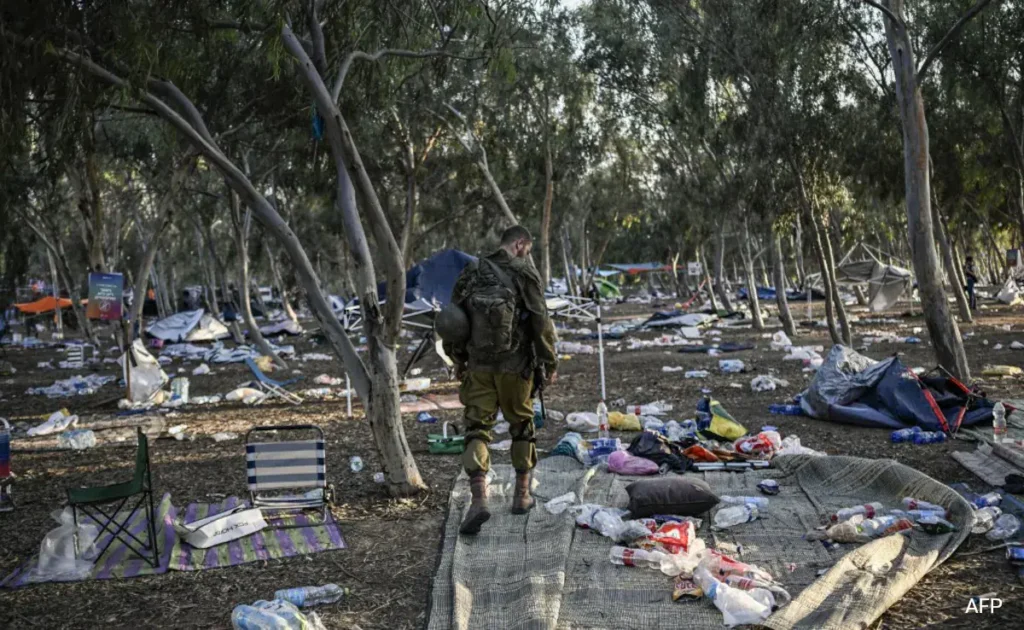Thousands of people gathered across southern Israel on Tuesday to mourn victims of the October 7, 2023, Hamas attack, marking two years since the deadliest assault in the country’s history. The anniversary comes as Israel and Hamas engage in indirect talks in Egypt over a U.S.-backed peace plan, even as the war continues to rage in Gaza.
The main memorial ceremony, organized by bereaved families, was held separately from the official government event scheduled for next week, a split reflecting deep divisions over Prime Minister Benjamin Netanyahu’s leadership. Many relatives of hostages accuse the government of failing to secure a ceasefire that could bring their loved ones home.
A Nation Still Grieving
At Kibbutz Nir Oz, mourners visited the burnt home of the Siman Tov family, killed in the initial assault. Near the Nova music festival site, where nearly 400 revelers were killed and dozens abducted, hundreds gathered at dawn to remember those lost. Photos and flags covered the site, now a national memorial. At 6:29 a.m. — the exact time the attack began — the music stopped for a moment of silence.
“We are still living with the scars of that morning,” said Yonatan Shamriz, who lost his brother Alon, one of three hostages accidentally killed by Israeli forces after escaping captivity. He helped organize the Tel Aviv memorial, which included musical tributes and speeches by families.
The War’s Toll
The Hamas-led attack two years ago left 1,200 Israelis dead and 251 abducted. While most hostages have since been released, 48 remain in Gaza — with around 20 believed to be alive. Hamas insists their release depends on a permanent ceasefire and Israeli withdrawal, terms Netanyahu rejects.
Israel’s response has been devastating. According to Gaza’s Health Ministry, more than 67,000 Palestinians have been killed since October 2023, with women and children making up roughly half. Independent experts describe the figures as the most reliable available. Entire towns in Gaza have been destroyed, and 90% of the population has been displaced, often multiple times.
Aid restrictions and ongoing bombardment have fueled famine conditions in Gaza City. Rights groups and international experts have accused Israel of genocide, while the International Criminal Court is pursuing arrest warrants for Netanyahu and other Israeli officials over alleged use of starvation as a weapon of war. Israel rejects the claims, insisting its campaign is a legitimate act of self-defense against Hamas, which it accuses of embedding within civilian populations.
Regional Escalation
The conflict has expanded far beyond Gaza. In the past two years, Israel has fought simultaneous battles with Iran and its allies, including Hezbollah in Lebanon. A 12-day U.S.-backed offensive in June targeted Iran’s military and nuclear facilities, killing several top commanders. Israel has also seized swathes of territory in Gaza, southern Lebanon, and parts of Syria.
Yet despite military successes, Netanyahu faces mounting domestic pressure. Weekly protests demand his resignation, accusing him of prioritizing political survival over rescuing hostages. Internationally, Israel is more isolated than it has been in decades.
Fragile Talks in Egypt
Indirect negotiations between Israel and Hamas resumed Monday in Sharm el-Sheikh, Egypt, under a new peace framework proposed by U.S. President Donald Trump. Hamas has so far agreed to only 9 of Trump’s 20 conditions, signaling difficult talks ahead.
Trump has warned Hamas not to stall, saying Washington will not tolerate delays. Netanyahu, in a televised address Saturday, vowed to return all hostages “within days,” either through the peace deal or continued military force.
For Palestinians, however, the humanitarian catastrophe deepens. Families in Gaza describe struggling to secure food and water while living in makeshift shelters. “The dream of a Palestinian state feels more distant than ever,” said one activist in Deir al-Balah, where thousands are sheltering in tents.
A Divided Memory
As Israelis mourn their dead, the shadow of ongoing war lingers. The government will hold its official ceremony next week, but for many, the grief is mixed with anger at leadership.
For the families of victims and hostages, October 7 remains not only a date of mourning but also a reminder of a conflict that shows no signs of ending.


